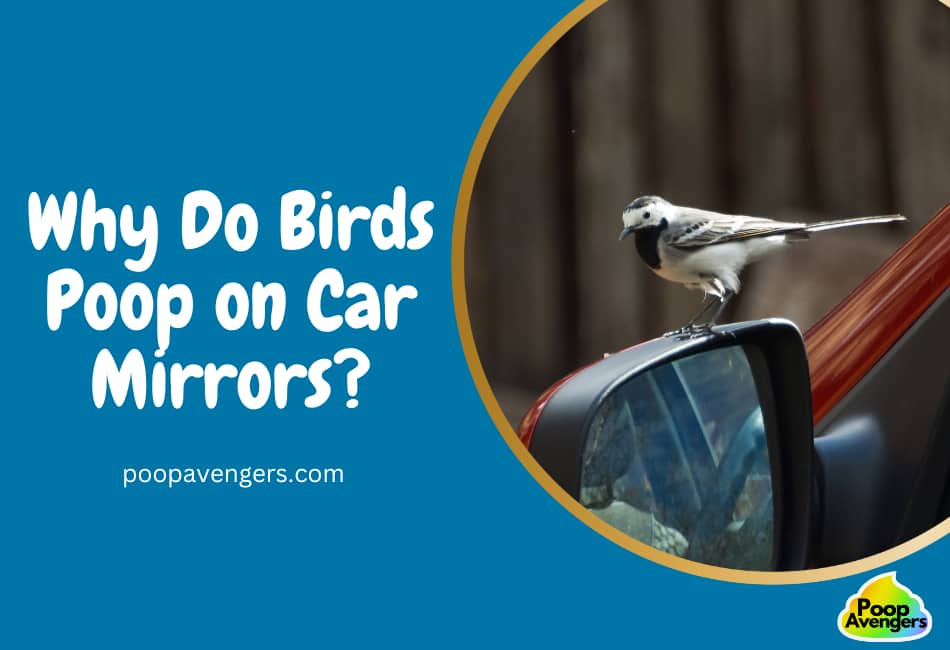As a car owner, I’ve often found myself perplexed by the sight of bird droppings on my car mirrors, wondering what could possibly explain this seemingly strange behavior.
I’m sure many of you have experienced this as well, perhaps leading to amusing personal anecdotes and sparking curiosity about why our feathered friends target car mirrors in particular.
This article will delve into the fascinating world of bird behavior, exploring the possible reasons behind this phenomenon.
From territorial instincts and mirror aggression to communication strategies and food source associations, we’ll unravel the mystery while also sharing relatable stories and offering practical tips to help fellow car owners tackle this messy issue.
The Behavior: Exploring the Phenomenon
Bird Behavior and Territory Marking
Like many other animals, birds have a natural instinct to mark their territory. This territorial behavior serves several purposes, such as defending resources, establishing dominance, and attracting mates.
One way birds achieve this is through defecation, which leaves a visible mark and scent that signals their presence to other birds. With their reflective surfaces, car mirrors may resemble rival birds or intruders to some species.
As a result, birds could perceive these mirrors as potential threats or competitors within their territory, leading them to target car mirrors with their droppings to assert their dominance and control over their perceived territory.
Attraction to Car Mirrors
Several factors make car mirrors attractive to birds, such as their reflective nature, shape, or color. Birds may be drawn to the shiny, smooth surfaces of car mirrors, mistaking them for water sources or simply finding them visually appealing.
Research on bird behavior in relation to car mirrors is limited, but some studies suggest that certain species are more prone to interacting with reflective surfaces.
For example, American Robins have been observed attacking their own reflections in windows and mirrors, indicating that they may be particularly attracted to or agitated by shiny surfaces.
Why Do Birds Poop on Car Mirrors? The Potential Reasons
1. Mirror Aggression
One possible explanation for birds pooping on car mirrors is mirror aggression, where birds perceive their own reflections as intruders or competitors.
This misperception can trigger territorial aggression, leading birds to attack their reflections in an attempt to drive away the perceived threat.
As a result of this aggressive behavior, birds may also defecate on or near the car mirrors as a further display of dominance and territorial marking.
2. Communication and Mate Attraction
Bird droppings could serve as a form of communication or a visual display to attract mates.
By marking objects like car mirrors with their droppings, birds may be signaling their presence, availability, or dominance to other birds in the area.
For example, a male bird might use his droppings to establish his territory and advertise his strength to potential mates, whereas a female bird might use her droppings to signal her readiness to mate.
3. Food Source Association
Another possible reason for birds targeting car mirrors with their droppings is an association with potential food sources.
Birds may notice insects or spiders on or around car mirrors and interpret these as a reliable food source. In response, they might defecate near or on the mirrors to mark their presence and claim the resource.
Additionally, some birds may be attracted to the insects drawn to the residue left behind by previous bird droppings, creating a cycle that encourages further defecation on car mirrors.
4. Curiosity and Playfulness
Birds, especially young ones, are known for their curiosity and playfulness. It’s possible that some birds may be attracted to car mirrors simply because they find them intriguing or entertaining.
The reflections, movement, and shiny surfaces could pique their interest, prompting them to interact with the mirrors in various ways, including leaving their droppings as a byproduct of their exploration.
5. Resting Spots
Car mirrors can also serve as convenient resting spots for birds, especially those located on parked vehicles. While perched on a car mirror, a bird might naturally defecate as part of its routine bodily functions.
In this case, the droppings on the mirror may not have any specific intent or purpose but are merely a result of the bird’s presence and normal behavior.
6. Mimicry and Social Learning
Birds are known for their ability to learn from one another, and some species are particularly adept at mimicry.
If a bird observes another bird interacting with a car mirror or leaving droppings on it, the observing bird may imitate this behavior, spreading the habit among the local bird population.
Over time, this social learning could contribute to an increased likelihood of birds pooping on car mirrors in certain areas.
Prevention and Mitigation: Tips for Car Owners
Dealing with bird droppings on car mirrors can be frustrating, but there are several practical tips and strategies that can help car owners prevent or minimize this issue.
Here are some suggestions to keep your car mirrors clean and bird poop-free:
Use Deterrents:
- Place visual or auditory deterrents near your car mirrors to scare away birds.
- Reflective tape, shiny objects like CDs, or even fake predators such as plastic owls or rubber snakes can discourage birds from approaching your vehicle.
Cover Your Mirrors:
- When parking your car for an extended period, consider using car mirror covers or simply wrapping a plastic bag around the mirrors to protect them from bird droppings.
- This barrier can also prevent birds from seeing their reflections, reducing the likelihood of mirror aggression.
Park in Sheltered Areas:
- Whenever possible, park your car in a garage or under a carport to shield it from birds.
- If these options aren’t available, try parking away from trees, power lines, or other structures where birds tend to congregate.
Regularly Clean Your Mirrors:
- Keeping your car mirrors clean can make them less attractive to birds, as they will be less likely to see their reflections or find insects attracted to leftover residue.
- Regular cleaning also prevents bird droppings from causing damage to your car’s paint or glass.
Remove Nearby Food Sources:
- If you notice that birds are frequently targeting your car mirrors, inspect the surrounding area for potential food sources, such as bird feeders or garbage cans, and remove or relocate them if possible.
- This can help reduce the number of birds in the vicinity of your vehicle.
Be Patient and Persistent:
- It may take some trial and error to find the most effective solution for deterring birds from your car mirrors.
- Be patient and willing to try various strategies until you find what works best for your specific situation.
Conclusion
In this article, we have explored the possible reasons behind birds pooping on car mirrors, including territorial marking, mirror aggression, communication, food source association, curiosity, resting spots, and mimicry.
By understanding the complex motivations and instincts that drive bird behavior, we can better appreciate the fascinating interactions between our feathered friends and the human-made objects in their environment.
We also shared amusing anecdotes from car owners who have experienced bird droppings on their car mirrors, highlighting the relatable and sometimes humorous aspects of this phenomenon.
Finally, we provided practical tips for preventing or minimizing bird droppings on car mirrors, offering valuable guidance for those looking to keep their vehicles clean and poop-free.
While dealing with bird droppings on car mirrors can be frustrating, it also serves as a reminder of the intricate and fascinating world of birds and their unique behaviors.
By taking the time to observe and understand these behaviors, we can foster a greater appreciation for the natural world and the countless ways in which humans and animals interact with one another.

